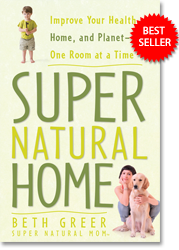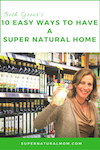Most of us don’t realize how the chemicals in the bottles that are lined up on our sinks and shower stalls impact our health. For example, here’s a dirty little secret about soaps and shampoos: most that are commercially made contain chemicals called parabens used as antimicrobial preservatives. The Environmental Protection Agency states that all parabens – methyl, propyl, and butyl – are endocrine disruptors. In other words, they interfere with the function of the endocrine system (the thyroid, pituitary, adrenal glands, pancreas, ovaries and testes) which regulate hormones. The Center for Children’s Health and the Environment at Mount Sinai School of Medicine in New York says that endocrine disruptors have been suspected of contributing to reproductive and developmental disorders, learning problems (like ADD), and immune system dysfunction.
Another widely used synthetic chemical, DEA or Diethanolamine, which is found in many shampoos and personal care products, has been shown to interfere with normal brain development in baby mice when applied to the skin of pregnant mice, say researchers at the University of North Carolina at Chapel Hill. “I don’t believe any woman who’s been using these products needs to have a sleepless night about having caused harm to her child,” said Steven Zeisel, M.D., Ph.D., professor of nutrition and associate dean of research in the School of Public Health at UNC. Zeisel added, “But it would probably be prudent to look at labels and try to limit exposure until we know more.” In the meantime, more than 100,000 tons of DEA are sold in the U.S. each year. It is used as a wetting or thickening agent in shampoos and hand soaps. Other names for DEA include Diethanolamine and Diethanolamide.
Stop and think about how many chemicals might be in all the personal care products you use every day from shampoo, conditioner, soaps, toothpaste, deodorant, sunscreen, skin cream, lotions, perfume, etc. It is unknown what happens when we are repeatedly exposed to minute amounts of them from combined sources. In addition, when you bathe, whatever chemicals that aren’t absorbed by your skin, are washed down the drain and might not be broken down in the water treatment process. Persistent concentrations of hormones, antidepressants, and antibiotics end up in our waterways and our drinking water says the U.S. Geological Survey.
Our municipal drinking water typically has 100 or so pharmaceutical medicines and personal care products in “significant concentrations.”It’s such an important issue that the EPA’s Office of Research and Development designed The Strategy Plan 2000, which makes identifying the risks of pharmaceutical and personal care products (PPCPs) one of its top five goals for protecting human and ecological health.And then there’s the issue of antibacterial soaps. According to Johns Hopkins University research, about 75% of a bacteria-killing chemical that people flush down their drains survives treatment at sewage plants, and most of that ends up in sludge spread on farm fields. Every year, the study says, an estimated 200 tons of two compounds – triclocarban and triclosan (found in antibacterial soaps and toothpaste) – are applied to agricultural lands nationwide. Toxicological tests have shown that these chemicals seem safe for human exposure, even in the high doses applied to skin. However, in water, triclosan can react with chlorine and turn into chloroform and dioxins which are linked to cancer. In other words, if you are brushing your teeth with toothpaste that has triclosan in it, and you are rinsing with tap water that has chlorine in it, you might be getting a little chemical reaction right in your mouth!
Previous research from John Hopkins suggested that triclocarban was among the top 10 contaminants in waterways, while triclosan was among the most prevalent in a national analysis of streams by the U.S. Geological Survey.
An independent federal advisory panel announced recently that popular antibacterial soaps and washes offer no more protection than regular soap and water. The panel, which advises the Food and Drug Administration, said by an 11-1 vote that it saw no added benefits to antibacterials when compared with soapy hand washing. Panelists also said soaps that use synthetic chemicals could contribute to the growth of bacteria that is resistant to antibiotics.
Faced with this unsettling information, don’t be tempted to throw up your hands and wonder “what can I really do about this?” The best thing to do is keep it simple: Read labels – bring a magnifying glass with you to the store if necessary – and buy products without all the added chemicals. Brad Black, Co-CEO of EO, with its factory in Northern California, has reformulated his line of soaps, shower gels, shampoos and conditioners in the distinctive dark blue bottles. “We have removed parabens from all our products,” he said. “We are a locally owned company with a conscience that is striving to make a high quality, safe product.”
Other companies with clean products include Eco-Dent Toothpowder, Dr. Bronner’s, Shikai, Ecco Bella, Wen Haircare, Avalon and Pharmacopia.You probably won’t find these products in most commercial markets, so look for them at health food stores and places like Whole Foods, online, and at your local farmer’s market.


